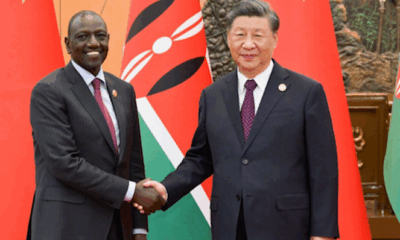Science
UK Faces Challenge in Securing Rare Earth Metals Supply

The United Kingdom is poised to confront significant challenges in securing a reliable supply of rare earth metals, which are essential for modern technology. Currently, China dominates the market, controlling approximately 85% of the global refining capacity for these critical materials. This situation has prompted the UK government to consider strategies that could reduce dependence on Chinese sources.
The term “rare earth metals” refers to a group of 17 elements that play a vital role in various technologies, from smartphones to electric vehicles. As the demand for these metals continues to grow, particularly with the rise of green technologies, the UK must take decisive steps to establish its own supply chains. Experts warn that failure to do so could hinder the country’s technological advancement and economic competitiveness.
Government Initiatives and Industry Response
To address this issue, the UK government is actively engaging with industry stakeholders. In March 2024, the government announced a new initiative aimed at developing domestic mining and refining capabilities. This plan involves collaboration with the Critical Minerals Association, which advocates for increased investment in the UK’s mining sector. The goal is to diversify supply sources and reduce reliance on imports, particularly from China.
Industry leaders have expressed cautious optimism regarding these initiatives. They believe that by investing in local resources and technology, the UK can mitigate some of the risks associated with over-dependence on foreign suppliers. The government is also exploring partnerships with countries that have substantial rare earth deposits, such as Australia and Canada, to secure alternative sources.
Despite these efforts, several challenges remain. Establishing new mining operations can take years, and the environmental impact of such projects is a growing concern. The UK will need to balance the demand for rare earths with sustainable practices to ensure that the extraction processes do not harm local ecosystems.
Global Market Dynamics and Future Prospects
The global market for rare earth metals is complex and subject to shifts driven by geopolitical factors. As tensions between China and other nations rise, particularly in trade relations, there is an increasing urgency for countries to secure their own rare earth supplies. In recent years, the prices of these metals have fluctuated significantly, influenced by China’s export policies and the global push for green technologies.
The UK’s commitment to reducing its reliance on Chinese rare earths aligns with broader international efforts to establish more resilient supply chains. As countries seek to enhance their technological capabilities and achieve sustainability goals, the race for rare earth metals will intensify. The UK’s ability to navigate this landscape will be crucial in determining its future role in the global technology market.
While the path forward is fraught with challenges, the UK has the potential to emerge as a contender in the rare earth sector. By investing in domestic production and fostering international partnerships, the country can not only secure its technological future but also contribute to a more balanced global supply chain for these essential materials.
-

 Entertainment3 months ago
Entertainment3 months agoAnn Ming Reflects on ITV’s ‘I Fought the Law’ Drama
-

 Entertainment4 months ago
Entertainment4 months agoKate Garraway Sells £2 Million Home Amid Financial Struggles
-

 Health3 months ago
Health3 months agoKatie Price Faces New Health Concerns After Cancer Symptoms Resurface
-

 Entertainment3 months ago
Entertainment3 months agoCoronation Street’s Carl Webster Faces Trouble with New Affairs
-

 Entertainment3 months ago
Entertainment3 months agoWhere is Tinder Swindler Simon Leviev? Latest Updates Revealed
-

 Entertainment4 months ago
Entertainment4 months agoMarkiplier Addresses AI Controversy During Livestream Response
-

 Science1 month ago
Science1 month agoBrian Cox Addresses Claims of Alien Probe in 3I/ATLAS Discovery
-

 World2 weeks ago
World2 weeks agoBailey Announces Heartbreaking Split from Rebecca After Reunion
-

 Health4 months ago
Health4 months agoCarol Vorderman Reflects on Health Scare and Family Support
-

 Entertainment4 months ago
Entertainment4 months agoKim Cattrall Posts Cryptic Message After HBO’s Sequel Cancellation
-

 Entertainment3 months ago
Entertainment3 months agoOlivia Attwood Opens Up About Fallout with Former Best Friend
-

 Entertainment2 weeks ago
Entertainment2 weeks agoCoronation Street Fans React as Todd Faces Heartbreaking Choice





















